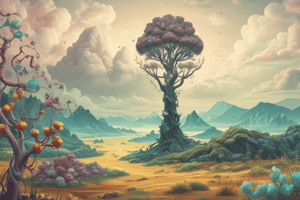Podcast
Questions and Answers
¿Cuál fue la fusión más significativa que tuvo lugar según el texto?
¿Cuál fue la fusión más significativa que tuvo lugar según el texto?
- Entre un arqueano y una bacteria (correct)
- Entre un protozoo y un hongo
- Entre una planta y un alga
- Entre un eucariota y un virus
¿Qué evento marcó el surgimiento de plantas, algas y cianobacterias según el texto?
¿Qué evento marcó el surgimiento de plantas, algas y cianobacterias según el texto?
- La extinción Permiano-Triásica
- La Explosión Cámbrica (correct)
- La Era Mesozoica
- La era actual de los humanos
¿Cuál era uno de los animales complejos que emergieron durante el periodo Cámbrico?
¿Cuál era uno de los animales complejos que emergieron durante el periodo Cámbrico?
- Aves
- Dinosaurios
- Trilobites (correct)
- Peces
¿Cuál fue el evento más infame de extinción masiva que ocurrió hace aproximadamente 252 millones de años?
¿Cuál fue el evento más infame de extinción masiva que ocurrió hace aproximadamente 252 millones de años?
¿Cuándo surgió Homo sapiens según el texto?
¿Cuándo surgió Homo sapiens según el texto?
¿Cuál es la hipótesis que sugiere que la Tierra primitiva era un mundo acuoso donde se sintetizaban compuestos orgánicos simples a partir de sustancias inorgánicas?
¿Cuál es la hipótesis que sugiere que la Tierra primitiva era un mundo acuoso donde se sintetizaban compuestos orgánicos simples a partir de sustancias inorgánicas?
¿Qué tipo de células emergieron del caldo primordial, careciendo de organelos con membranas y siendo capaces de reproducirse?
¿Qué tipo de células emergieron del caldo primordial, careciendo de organelos con membranas y siendo capaces de reproducirse?
¿Qué tipo de células comenzaron a formarse hace aproximadamente 1.5 mil millones de años al fusionarse las procariontes?
¿Qué tipo de células comenzaron a formarse hace aproximadamente 1.5 mil millones de años al fusionarse las procariontes?
¿Qué caracteriza a las células eucariontes en comparación con las procariontes?
¿Qué caracteriza a las células eucariontes en comparación con las procariontes?
¿Qué tipo de moléculas, como aminoácidos, azúcares y nucleótidos, se combinaron en el caldo primordial para dar lugar a moléculas más complejas?
¿Qué tipo de moléculas, como aminoácidos, azúcares y nucleótidos, se combinaron en el caldo primordial para dar lugar a moléculas más complejas?
Flashcards are hidden until you start studying
Study Notes
Unraveling the History of Life: Origins and Evolution
Life on Earth, a complex and diverse tapestry that spans billions of years, began with an intricate dance of chemistry and biology. Our journey to understand the origins of life, and how it has evolved over time, is a fascinating exploration into the fabric of our existence.
The Origins of Life: The Primordial Soup
The story of life's beginnings is rooted in a hypothesis called the "primordial soup." This concept suggests that, around 4 billion years ago, the early Earth was a watery world where simple organic compounds were synthesized from inorganic substances. These compounds, such as amino acids, sugars, and nucleotides, combined to create more complex molecules, eventually giving rise to the first self-replicating entities.
The Rise of Cells: The First Life Forms
From the primordial soup emerged the first cellular life forms, known as prokaryotes. These simple cells lacked membrane-bound organelles, such as mitochondria and chloroplasts, and were capable of reproduction. Prokaryotes include both bacteria and archaea, which remained the only forms of life on Earth for about 3 billion years.
The Evolution of Eukaryotes: Merging Cells
Around 1.5 billion years ago, prokaryotes began to merge, forming eukaryotic cells. These cells contain membrane-bound organelles, which allow them to perform more specialized functions. The most significant merger took place between an archaean and a bacterium, resulting in the formation of the first eukaryote capable of photosynthesis. This event led to the evolution of plants, algae, and cyanobacteria, which in turn, created the conditions for other life forms to emerge.
The Cambrian Explosion: The First Diverse Life Forms
The Cambrian period, which spanned from approximately 541 to 485 million years ago, saw an explosion of diverse life forms. This period marked the emergence of complex animals, such as trilobites, mollusks, and arthropods. The Cambrian explosion has been a subject of intense scientific scrutiny, with debates centered on the causes and rapidity of this event.
The Extinction Events: Waves of Change
Life on Earth has not been a linear journey; it has been punctuated by periods of mass extinctions. The most infamous of these extinction events, the Permian-Triassic extinction, occurred approximately 252 million years ago and wiped out around 90% of marine species and 70% of terrestrial species. In stark contrast to these mass extinctions, other periods have seen the rise of new life forms, such as the Mesozoic era, during which dinosaurs ruled.
The Arrival of Humans: The Most Recent Chapter in Life's History
The most recent chapter in life's history is the emergence of Homo sapiens around 200,000 years ago. Our species has since spread across the globe, dramatically altering the Earth's landscape and ecosystems through agriculture, urbanization, and the development of advanced technology.
Conclusion
The history of life is a complex and rich tapestry, marked by periods of growth, transformation, and extinction. As we continue to unravel the mysteries of our collective origins, we gain a deeper understanding of our place in the world and the interconnected nature of our existence. Whether marveling at the humble beginnings of life in the primordial soup or the breathtaking diversity of life forms that have emerged since, the story of life is one of wonder and awe.
Studying That Suits You
Use AI to generate personalized quizzes and flashcards to suit your learning preferences.



